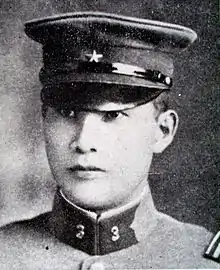Shiro Nonaka | |
|---|---|
 | |
| Native name | 野中 四郎 |
| Born | 27 October 1903 Okayama, Okayama Prefecture, Empire of Japan |
| Died | 29 February 1936 (aged 32) Tokyo City, Tokyo Prefecture, Empire of Japan |
| Service/ | |
| Years of service | 1924–1936 |
| Rank | Captain |
| Battles/wars | 26 February Incident † |
Shirō Nonaka (野中 四郎, Nonaka Shirō, 27 October 1903 – 29 February 1936) was an Imperial Japanese Army officer who was a central conspirator in the 26 February Incident in 1936.[1] His final rank was Captain.
Career
Nonaka was born in the city of Okayama, in a family of career military officers. He enrolled in Tokyo Fourth Middle School (now Toyama High School in the Shinjuku City),[2] and graduated in the 36th class of the Imperial Japanese Army Academy in 1924. Later, he became an Infantry Captain in 1933.[1] During the February 26 Incident, he led 500 soldiers to take over Tokyo Metropolitan Police Department headquarters, but committed suicide on 29 February when the coup d'état failed.[1]
Portrayals
Film
- Eiichi Sugasawara (『叛乱]』, 1954, Shin Saburi)
- Asao Matsumoto (『重臣と青年将校 陸海軍流血史』, 1958, Michiyoshi Doi)
- Fumitake Omura (『銃殺 2・26の叛乱』, 1964, Tsuneo Kobayashi) (as "Captain Noda")
- Kenichi Hagiwara (『226』, 1989, Hideo Gosha)
Theatre
- Masaru Yamamoto (『狂騒昭和維新』, 1975)
- Ryuichi Onodera (『恋が散る、雪が舞う』, 2005)
See also
Notes
- 1 2 3 "Nonaka Shirō". Nihon jinmei daijiten+Plus (in Japanese). Kōdanasha. Retrieved 8 April 2014.
- ↑ 日本陸海軍総合事典 General Dictionary of the Armed Forces of the Empire of Japan, edited by Ikuhiko Hata (University of Tokyo Press, 2005, in Japanese)
This article is issued from Wikipedia. The text is licensed under Creative Commons - Attribution - Sharealike. Additional terms may apply for the media files.